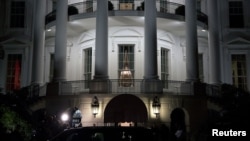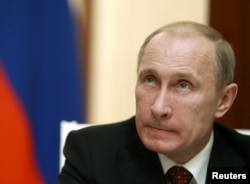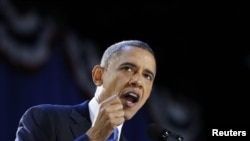MOSCOW —
Russian President Vladimir Putin has invited newly re-elected U.S. President Barack Obama to visit Moscow next year.
Mr. Putin’s outstretched hand contrasts to the cold shoulder offered President Obama four years ago, at the time of the American’s first election.
At that time, Europe was swept with Obama-mania. But the Kremlin responded to Barack Obama’s election by announcing that Russia would install missiles in Kaliningrad, Russia’s westernmost territory.
Alexander Romanovich, a Duma deputy who is on the foreign affairs committee of Russia’s parliament, said the Kremlin is relieved that there will be continuity in Washington.
“If we talk about the troika, I see positive developments,” he said, referring to the two presidents and Russian Prime Minister Dmitry Medvedev. “I think a mutual understanding was achieved.”
The Kremlin’s pragmatism is grounded in the reality that the two presidents are now fated to work together through 2016. President Obama’s four-year term will entirely overlap with the rest of President Putin’s six-year term.
The Kremlin almost certainly was relieved that the Republican candidate, Mitt Romney, did not win. Many Russians saw Romney as continuing Cold War views, after he branded Russia America’s “number-one geostrategic foe.”
"Reset" in motion
A few hours after the Obama victory was announced, Prime Minister Medvedev gave this blunt assessment to reporters: “I am happy that the president of the biggest and most influential state in the world will not be a person who thinks Russia is the number-one enemy - that’s paranoia.”
“Obama is easy to understand and a predictable partner,” continued the Russian prime minister, who has had many meetings with the American president. “Whether we like America or not, every Russian family depends on how the dollar is doing.”
Sergei Markov, a pro-Kremlin academic, is cautiously optimistic. He said, “I think we have quite good [perspective] for improving the relationship between Russia and United States because Barack Obama is not hostage of stereotypes of the Cold War period.”
Markov, who is a vice president of Plekhanov Russian Economic University, added that “Barack Obama has an open mind to the modern world. And Barack Obama sees a new Russia, a modern Russia.”
Analysts predict that the relationship with Russia will remain largely transactional - as in the case of American use of an air base in southern Russia as a logistics hub for flying equipment out of Afghanistan. In a contract worth hundreds of millions of dollars, the United States uses a Russian air cargo company and pays landing fees for use of the strip.
This kind of cooperation is often obscured by the official anti-Americanism that has filled Russia’s airwaves over the last year.
Criticism vs. cooperation
Vladimir Milov, an opposition activist, said the anti-Americanism is largely designed to bolster popular support for President Putin.
“You have this bizarre situation of this post-Soviet criticism of the U.S., combined with better integration and growing integration of the Russian establishment with the Western countries,” he said.
U.S. Ambassador to Russia Michael McFaul has been the target of much of this official anti-Americanism. Within hours after President Obama claimed victory, Ambassador McFaul gave a series of interviews to the media where he predicted that the second Obama administration would focus on building economic ties between Russia and the United States. This year, American exports to Russia are to hit $10 billion - five times the level of 10 years ago.
On the strategic side, a major stumbling block is a missile defense system that the U.S. plans to build to shield Europe from missiles flying west from Iran. Washington argues that this system will be far too small to affect Russia’s massive missile arsenal, which is designed to fire rockets north, to hit the United States.
The Kremlin argues that the American missile defense system and its technology could be expanded to eventually upset the Russia-U.S. nuclear balance.
Ed Lozansky is a Soviet émigré who every year organizes the World Russian Forum, a Washington gathering designed to expose Americans to Russian points of view.
He said missile defense is the top stumbling block for President Putin - “He is ready to work with America and be an American ally, if we find solution on missile defense,” he said.
But other analysts said President Putin wants to carve out a role for Russia as a respected regional power - not as a Western ally.
Romanovich, the Duma deputy, said he agrees with a post-election RBK television poll where 75 percent of respondents forecast that the second Obama administration would bring no major change in U.S.-Russian relations.
“I would support the opinion of 75 percent of Russians that things will remain like they were before,” Romanovich said. “Because there are still problems connected to Georgia, the eastward expansion of NATO, problems in the Middle East, and problems with Iran.”
With both presidents fated to work together for the next four years, the question remains - can they build on the last four years to fashion a more productive relationship between the United States and Russia?
Mr. Putin’s outstretched hand contrasts to the cold shoulder offered President Obama four years ago, at the time of the American’s first election.
At that time, Europe was swept with Obama-mania. But the Kremlin responded to Barack Obama’s election by announcing that Russia would install missiles in Kaliningrad, Russia’s westernmost territory.
Alexander Romanovich, a Duma deputy who is on the foreign affairs committee of Russia’s parliament, said the Kremlin is relieved that there will be continuity in Washington.
“If we talk about the troika, I see positive developments,” he said, referring to the two presidents and Russian Prime Minister Dmitry Medvedev. “I think a mutual understanding was achieved.”
The Kremlin’s pragmatism is grounded in the reality that the two presidents are now fated to work together through 2016. President Obama’s four-year term will entirely overlap with the rest of President Putin’s six-year term.
The Kremlin almost certainly was relieved that the Republican candidate, Mitt Romney, did not win. Many Russians saw Romney as continuing Cold War views, after he branded Russia America’s “number-one geostrategic foe.”
"Reset" in motion
A few hours after the Obama victory was announced, Prime Minister Medvedev gave this blunt assessment to reporters: “I am happy that the president of the biggest and most influential state in the world will not be a person who thinks Russia is the number-one enemy - that’s paranoia.”
“Obama is easy to understand and a predictable partner,” continued the Russian prime minister, who has had many meetings with the American president. “Whether we like America or not, every Russian family depends on how the dollar is doing.”
Sergei Markov, a pro-Kremlin academic, is cautiously optimistic. He said, “I think we have quite good [perspective] for improving the relationship between Russia and United States because Barack Obama is not hostage of stereotypes of the Cold War period.”
Markov, who is a vice president of Plekhanov Russian Economic University, added that “Barack Obama has an open mind to the modern world. And Barack Obama sees a new Russia, a modern Russia.”
Analysts predict that the relationship with Russia will remain largely transactional - as in the case of American use of an air base in southern Russia as a logistics hub for flying equipment out of Afghanistan. In a contract worth hundreds of millions of dollars, the United States uses a Russian air cargo company and pays landing fees for use of the strip.
This kind of cooperation is often obscured by the official anti-Americanism that has filled Russia’s airwaves over the last year.
Criticism vs. cooperation
Vladimir Milov, an opposition activist, said the anti-Americanism is largely designed to bolster popular support for President Putin.
“You have this bizarre situation of this post-Soviet criticism of the U.S., combined with better integration and growing integration of the Russian establishment with the Western countries,” he said.
U.S. Ambassador to Russia Michael McFaul has been the target of much of this official anti-Americanism. Within hours after President Obama claimed victory, Ambassador McFaul gave a series of interviews to the media where he predicted that the second Obama administration would focus on building economic ties between Russia and the United States. This year, American exports to Russia are to hit $10 billion - five times the level of 10 years ago.
On the strategic side, a major stumbling block is a missile defense system that the U.S. plans to build to shield Europe from missiles flying west from Iran. Washington argues that this system will be far too small to affect Russia’s massive missile arsenal, which is designed to fire rockets north, to hit the United States.
The Kremlin argues that the American missile defense system and its technology could be expanded to eventually upset the Russia-U.S. nuclear balance.
Ed Lozansky is a Soviet émigré who every year organizes the World Russian Forum, a Washington gathering designed to expose Americans to Russian points of view.
He said missile defense is the top stumbling block for President Putin - “He is ready to work with America and be an American ally, if we find solution on missile defense,” he said.
But other analysts said President Putin wants to carve out a role for Russia as a respected regional power - not as a Western ally.
Romanovich, the Duma deputy, said he agrees with a post-election RBK television poll where 75 percent of respondents forecast that the second Obama administration would bring no major change in U.S.-Russian relations.
“I would support the opinion of 75 percent of Russians that things will remain like they were before,” Romanovich said. “Because there are still problems connected to Georgia, the eastward expansion of NATO, problems in the Middle East, and problems with Iran.”
With both presidents fated to work together for the next four years, the question remains - can they build on the last four years to fashion a more productive relationship between the United States and Russia?










